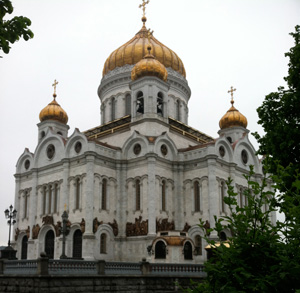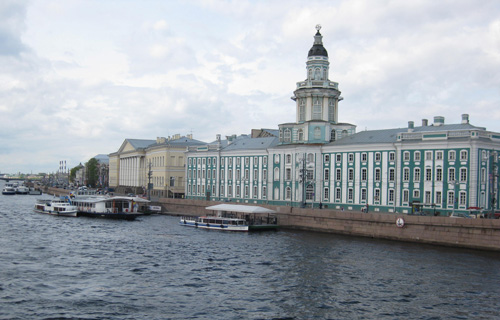This trip has been postponed; please see new dates and info.
The Reed Russian department and the alumni office are pleased to announce our 11th-annual East European tour, scheduled for April 26-May 11, 2014. This year we will include both Russia and Ukraine in our investigation, visiting the three great capitals of Kiev, Moscow, and St. Petersburg as we review East Slavic history and culture from the tenth century through the modern era. Besides devoting unhurried time ahead of the summer crush to the spectacular world-heritage architectural sites and extraordinary museums and performance halls of the three capitals, we will visit the ancient museum town of Pereslav near Kiev and the splendid summer palace and park in Gatchina south of St. Petersburg. Along with a carefully devised program of exceptional interest and richness, the tour will include presentations by the tour organizer and leader, Russian scholar and former Reed professor Judson Rosengrant, as well as by local English-speaking guides.

The tour requires no knowledge of foreign languages and is open to anyone who would like to learn about Russia and Ukraine and their vital place in the world. For more information, including a detailed itinerary, please write to Dr. Rosengrant at jrosengrant@alumni.stanford.edu or call him at 503/880-9521.
Read this dispatch from Brad ’61 and Rozelle Wright ’61, who enjoyed the trip in May 2012, in Reed magazine.

Traveling to Russia in its currently mind-numbingly homophobic environment is disgusting. I wonder why Reed didn’t organize trips to South Africa in the 80s? Oh, that’s right. Apartheid. Avoiding such travel was the right thing to do. Why should Reed avoid Russia until after such laws are unquestionably repealed? Because it is the right thing to do.
In the meantime, we continue to avoid trips to Asia, Africa, etc. Amazing lack of imagination and diversity here, people.
We are interested in travel with Reed. However we need longer lead time to plan ahead. For instance, we have already booked trips for 2014. Keep us in mind. Carol
I have been living in Kiev for six years now. Will be glad to join you for a meal if you come, perhaps share ideas about the things I find most interesting about the city. Graham Seibert, ex’64
NB: December issue of Reed magazine may have a squib on our life here.
Statement by Judson Rosengrant, Russian scholar and former Reed professor, and Lena Lenček, Professor of Russian & Humanities
As those chiefly responsible for the East-European (Russia and Ukraine) trips on behalf of the Reed Russian Department, we have followed the comments on this site with interest and some dismay.
Many things have struck us, but not least is the unquestioning credence given by some to Harvey Fierstein’s New York Times op-ed piece of last July, reasonable sounding and even well intentioned though it may have been.
If you think—as you must if you are an intellectually and morally responsible person with a genuine historical memory—about the incalculable scale of the human suffering and loss of life during the Holocaust, then you will be deeply embarrassed by Fierstein’s glib comparison of Putin’s erratic record on human rights to Hitler and the millions of people he destroyed. And you will also be aware, with similar embarrassment, that what happened in Volgograd last May with regard to the beating death of a homosexual man has happened in our own country many times over, although no one has ever been so witless as to suggest, as Mr. Fierstein did in regard to Russia, that it enjoys an implicit Federal sanction.
Indeed, the very idea that someone could be arrested in Russia as a homosexual merely because someone else said he or she was is preposterous on the face of it. Russia isn’t the Soviet Union, and Putin isn’t remotely a Stalin either.
We would therefore suggest that before anyone proposes a policy, however local it may be, he or she make an independent study of the facts and issues, instead of relying on the bald, second-hand assertions of someone whose views of Russia would appear to be shaped more than a little by transposed Cold War demonology.
For there will, fortunately, always be a great difference between an ancient country and culture of enormous diversity and complexity and the policies of its current head of state, to whatever degree they may actually be policies and his own.
But there is another, even more important, point to be made here. When we visit Russia as a Reed program we are not in fact visiting Putin and his kind, because Russia does not belong to him or to them, anymore than the United States belongs to its president. We are visiting the other people, including the ones identified in this matter as victims. And we are visiting those people not as passive travelers but as intelligent, curious, diverse (including gay) observers who want to see with our own eyes and learn with our own minds, and who might in fact resent being told (rather “Putinishly,” in fact) that we, and the institution that sponsors our inquiries, may not be allowed to do so.
Nor should it be overlooked that we are, inevitably and properly, visiting Russia, and Ukraine too, as strong advocates of our own reasoned values and philosophies. And that essential process of ground-level, grass-roots, first-hand observation and exchange can, in its cumulative effect, be an enormously powerful thing, much more powerful than boycotting a people, a majority, an entire nation, because we are distressed, or even outraged, by what we have been given to believe is the particular policy of a government.
Encouraging, rather than preventing such exchanges is one of the reasons why the college includes among its operating principles the principle that Reed does not take positions on “political issues that do not directly affect the fulfillment of its educational mission.” Indeed, our first operating principle declares that “the educational mission of the college requires the freest exchange and most open discussion of ideas,” and that “the use of censorship or intimidation is intolerable in such a community.”
That essential process of individual interaction and exchange is, in any case, not one that should ever be casually dismissed as “precisely” the same advocated (if it ever was) in regard to visiting South Africa during Apartheid, or Burma before the recent changes, or whatever rhetorically attractive but culturally and historically naïve comparison we wish to make. Russia is itself in all its exhilarating and distressing complexity, and it cannot be reduced to a single concept or public issue. And our relation to and engagement with and investigation of that important country and culture should never be reduced to a single Procrustean adversarial strategy either.
The elimination or, more realistically, significant reduction of human-rights abuses of the kind that prompted this discussion requires accurate information grounded in responsible journalism and scholarship, a clear understanding of premises, a sophisticated grasp of historical and cultural dynamics, and the unfortunately all too rare wisdom and restraint and sense of proportion that come from realizing that we ourselves are hardly in a position to instruct the rest of the world, however right we may believe ourselves to be in regard to a particular issue.
So, despite the vehemence and certitude of the comments to the contrary, we would urge those of you with thoughtful, independent minds to visit Russia and Ukraine with us this year—to come and observe for yourselves and make your own judgments. If you do that, you may find that what you assumed was the case and what actually is are, as they famously used to say in Yiddish Odessa with fractured Russian grammar and an amused wink, Две большие разницы: Two big differences.
Best wishes,
Judson Rosengrant
Lena Lenček
Correction by Mike Teskey, director of alumni & parent relations:
In the various announcements for the April 26 to May 11 travel-study program in Russia and Ukraine, I erred by including airfare in the program price. To compound things, I also included an incorrect base price. I apologize for both.
Because the tour organizer, Jud Rosengrant, strives to accommodate individual requests and because people travel from all over to embark on these journeys, it is best to direct all program inquiries directly to him. Past travelers have found that their arrival and departure requests, lodging, and visa requirements are much more easily managed in consultation with Jud.
As so many of the travelers to Russia over the past ten years have discovered, this is a terrific program and traveling with Reedies under the leadership of Jud Rosengrant is an wonderful way to experience this part of the world and to better understand its history and culture.
Again, my apologies for the misinformation.
—Mike
Mike Teskey
Alumni & Parent Relations
Reed College
Statement by Evgenii V. Bershtein, associate professor of Russian
I am a Reed professor as well as an openly gay Russian (or rather, bi-national) man. I have been writing and publishing on Russian gay history and culture in both Russian and English. In light of Putin’s regime’s recent homophobic provocations, I feel that international acts of solidarity with the Russian LGBT community are, indeed, necessary. However, I don’t find calls for a complete Western boycott of Russia to be productive. First of all, it is unfair to equate the Russian people and culture with Putin’s administration and its policies. By not traveling to Russia and not making human connections there, pro-gay rights Americans would make Russian LGBT people feel more isolated, not more empowered. I don’t have a single LGBT Russian friend (and I have many) who believes that the total boycott would be a good idea.
One can think of several more effective ways to help the Russian LGBT community and the cause of human rights in Russia in general. Here are some examples: (a) engaging Russian, American, and transnational corporations who do business in Russia and can influence Russian policy-makers; (b) giving political, moral and financial support to groups and organizations that work to improve the human rights situation in Russia; (c) assisting persons and organizations who find themselves victimized by Putin’s regime. Banning those Russian officials, who are known to violate the human rights, from visiting Western countries and investing here could also be quite effective. (The Magnitsky Law needs to be enforced).
Here is another thought: despite many instances of discrimination, Russian gays are still fairly free to be who they are (immeasurably freer than during the Soviet period). Homosexuality, open or discreet, is not punishable by Russian law. We, gay Russians, have organizations, publications, internet sites, clubs, film festivals and a fairly active cultural scene; we also have the support of much of Russia’s educated class. At the same time, some U.S. allies in the Muslim world and Africa not only criminalize gay sex but also punish it most severely, in some cases by death. It is perplexing to many of my gay friends in Russia that the West pays so little attention to the truly grave human rights situation of non–white and non–Christian gays and lesbians. Despite its exceptionally rich culture and vast natural resources, Russia is a developing country, both economically and socially. It has a complicated love-hate relationship with Western civilization and its values. The West needs to encourage Russia’s development toward freedom and equal rights for all, not to scorn and isolate the Russian people.
Due to political instability in Russia and Ukraine, this trip has been cancelled.